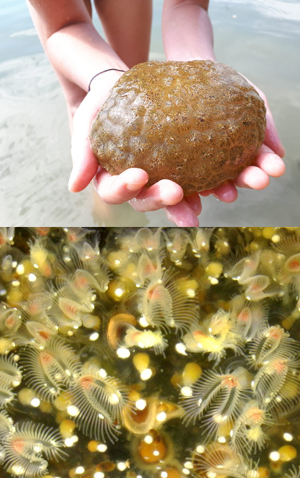Bryozoan biology
Bryozoan biology
Evolution of bryozoans
One of our main research areas deals with the evolutionary morphology of bryozoans focussing particularly on character evolution of the different bryozoan clades. For that purpose, we study various morphological aspects of bryozoans including the neuro-muscular system, developmental aspects or histological details in order to infer what the morphological ground pattern of bryozoans looked like and how the different groups evolved. With 6.000 recent species described, there is an immense potential for future work.
Ongoing:
> Nervous system morphology of of cheilostome bryozoans (Prömer)
> Organogenesis in the budding process of fredericellid and plumatellid Bryozoa (Klymkiw)

Taxonomy and biodiversity of ctenostome and phylactolaemate bryozoans
Ctenostome bryozoans are a totally understudied group of bryozoans that occur mostly in marine habitats. Their systematics, taxonomy, phylogeny and biodiversity remain actually little studied as they are extremely challenging as they show a high morphological variability and lack any rigid, calcified skeletons. Similarly, freshwater bryozoans of the taxon Phylactolaemata are another group studied by only few researchers in respect to morphology, taxonomy and phylogeny. My research aims to gather also in this small group new insights into their biology and evolution.
Ongoing:
> Embryonic development of phylactolaemate bryozoans (Bibermair)
Recently completed:
> Lifecycle and morphology of an undescribed bryozoan species from the Mediterranean (Decker)
Boring communities and effects of ocean acidification
Boring bryozoans are an immensely neglected group of bryozoans that are totally unknown since the late 1970ies. They represent an extremely abundant part of boring organisms and occur in almost all molluscs shells and other biomineralized substrates. My main interest lies in analysing boring communities over time and space and realize the effects of anthropogenic influences over time, i.e. ocean acidification on bioerosion rates.
Study & research opportunities
Interested in doing an internship, academic thesis or postdoc in bryozoan biology? Please contact Thomas Schwaha.
